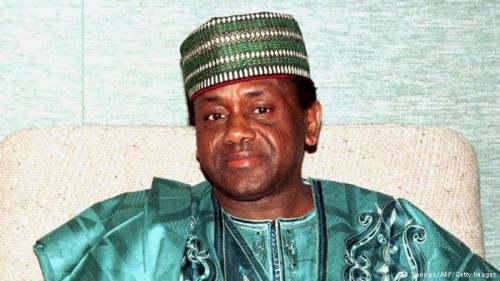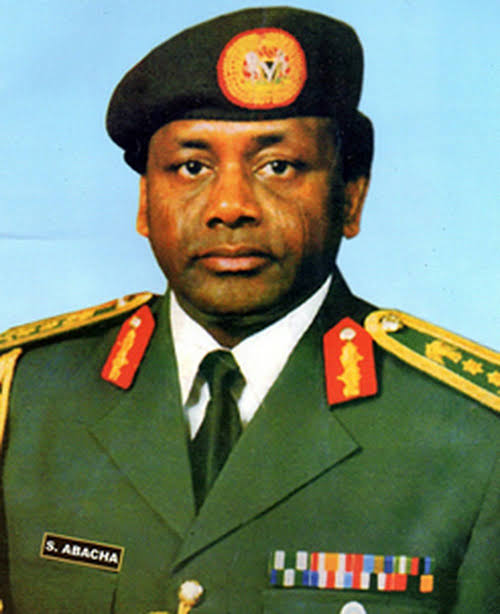Abacha was highly misunderstood â€' Former ADC
.jpg)
Daily Trust: What motivated you into the military?
Did you know? You can comment on this post! Just scroll down
Major-General Abdul-Malik Jibrin: I was born in 1954 in Kano and was taken to Kaduna as a kid. So I grew up in Unguwan Shanu, Kaduna, which is contiguous with the Nigerian Defence Academy (NDA) and the Ribadu Cantonment, popularly called Kotoko Barracks. Seeing soldiers on parade, patrol, amongst others, influenced me into joining the army.
Before then, I attended Sultan Bello Primary School between 1963 and 1969. After completion I went to Ansarul Islam Grammar School in Ijomo-Oro, Kwara State, and spent a year. Then I came to Sheikh Sabah, named after the founder who was then the Emir of Kuwait. It was later renamed Sardauna Memorial College when the military government took over missionary schools. From there I went to the Nigerian Defence Academy from 1974 to 1976 as a regular cadet on Course 17. I was commissioned into the Infantry Corps in 1977 as a second lieutenant.
DT: Did you choose to serve in the military police (MP) and did that inform your studying law?
Major-General Jibrin: After graduation from NDA, I wanted to further my education and my intention was to study law, which I did, and at that time the Nigerian Army did not have a provision for an infantry officer to become a lawyer except the Nigerian Army Military Police Corps (NAMPC) which is in charge of maintaining law within the army. I secured admission into the Ahmadu Bello University, Zaria, and after I graduated, I applied to change corps from infantry to military police.
DT: How difficult was it juggling studies with the rigours of military work?
Major-General Jibrin: Interestingly, as a young officer, I had the privilege of getting admission into the university and it was strange to officers then, as many felt you wanted to go to the university and you didn’t want to work in the army. I was posted to 203 Infantry Brigade in Ijebu-Ode and my seniors where understanding, like Major Ajegbe became interested and said, “Young officer you want to go to the university, we did not have the zeal but we will support you as it is better to go to the university at a young age. He referred me to his course mate, the then Brigade Major, Major (later) Colonel Joshua N. Madaki, who made it possible for me to see the then Brigade Commander, then Lieutenant Colonel Aliyu Gusau (now a retired lieutenant general) and that was how I was cleared and offered full sponsorship.
After graduation I went and completed law school and was called to the bar. When I reported to the barracks, I was deployed as an investigator at the Special Investigation Battalion (SIB). Somewhere along the line I had another opportunity to reposition myself as a professional military police officer and so I applied to read for a masters’ degree in Criminology in the University of Kil in the United Kingdom. I was offered two years scholarship and on getting there I discovered that it was a one year full time programme and two years part time. I wrote examination and completed it in one year. I had one extra year, so I enrolled for masters in Law. And the third and last master’s degree I have is an MBA from Bristol University campus in Pakistan when I was posted as the Defence Adviser to the Nigerian High Commission. So I did not have problem between my military life and studies.
DT: Did you meet General IBM Haruna in the university as he went back to read Law when he retired?
Major-General Jibrin: Exactly, General IBM Haruna was my boss, senior and classmate with a difference. I was privileged to know him as a retired general while I was a young officer, fresh from NDA. Many of our classmates are in the Supreme Court, like Justice Ibrahim Tanko and Justice Sidi Bage; while some are in the Court of Appeal.
DT: At a time you were the aide de camp (ADC) to the late General Sani Abacha. What is the most striking life lessons you learnt in that capacity?
Major-General Jibrin: As ADC, I was coordinating the activities of the Commander-in-Chief (C-in-C) as everybody that wanted to see him must pass through me.
The opportunity exposed me a lot, especially under the person of the standing of General Sani Abacha. He was a gentleman who was mostly misunderstood, he was not somebody who actually tied himself to a particular schedule and you could have problem of coordinating or predicting him in terms of his daily activities.
When there was a visitor, you had to listen to him/her and articulate if he/she had an important information because if you dismiss him/her and it turns out that he/she had important information, it was bad for you.
Therefore, that made me to develop additional sense of patience to listen and sieve out what was okay and put it down in writing and see the C-in-C and tell him who wanted to see him and left him to decide. That office exposed me a lot to meet people within and outside the country and it has also taught me to develop interpersonal relationship on how to interact with people.
Article Posted 7 Years ago. You can post your own articles and it will be published for free.
No Registration is required! But we review before publishing! Click here to get started
One Favour Please! Subscribe To Our YouTube Channel!
468k
Cook Amazing Nigerian Dishes, Follow Adorable Kitchen YouTube Channel!
1.1m
Like us on Facebook, Follow on Twitter
React and Comment
Click Here To Hide More Posts Like This
Watch and Download Free Mobile Movies, Read entertainment news and reports, Download music and Upload your own For FREE.
Submit Your Content to be published for you FREE! We thrive on user-submitted content!
But we moderate!

















